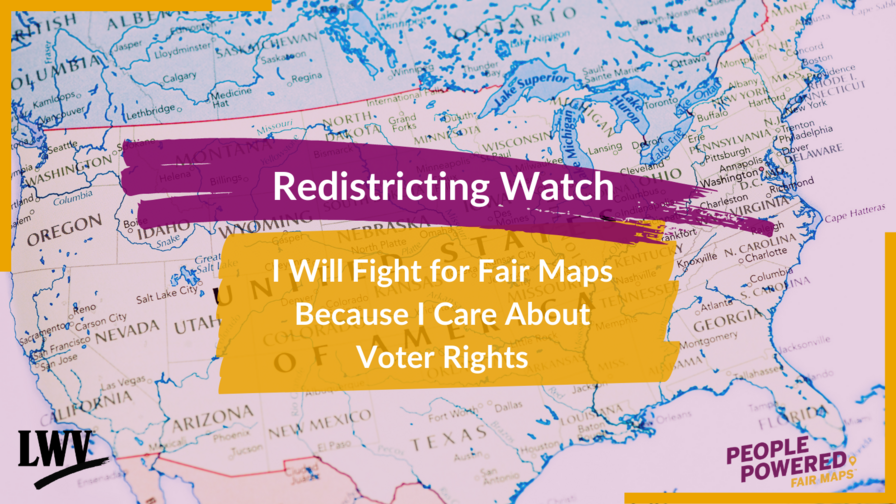Redistricting Watch: I Will Fight for Fair Maps Because I Care About Voting Rights
This blog was written by Debra Cronmiller, Executive Director of the League of Women Voters of Wisconsin
In the past decade, Wisconsin has experienced a true setback in representative government. This change is rooted in the extreme gerrymandering of our congressional and legislative maps. In a state that is truly purple, one party has successfully taken hold of two-thirds of the legislative districts.
In this way, partisan gerrymandering has eroded the power of the people’s vote. As a result, we’re working to ensure the people’s voices are once again heard in our state house by creating fair maps in the 2021 redistricting process. Unlike our current, gerrymandered maps, fair maps will force legislators to act according to the will of the people and not partisan politics.
Fair Maps are critically important to Wisconsin if we are to restore our progressive heritage. The freedom from tyranny, codified in our Constitution, not only means the right to vote, but that the nation will be governed by the people through the elected representatives the people choose. Wisconsin has lost its reputation as a leader in good government practices.
We can earn this reputation back if we allow the people’s voices to be heard.
Gerrymandering & Restrictive Voting Bills
The League of Women Voters of Wisconsin believes that voting is a fundamental right that must be guaranteed. Casting your ballot should be a safe, accessible, and positive experience for all people. To ensure that this is the case, lawmakers should avoid measures that place undue burdens on the voter or erect barriers to voter participation.
To that end, we opposed the recent bills introduced in our Legislature that actively work to suppress the vote. How does this relate to our fight for fair maps? These bills, similar to bills introduced across the nation, are made possible by Wisconsin’s gerrymandered maps.
The way that our maps are currently drawn has granted one party a near-supermajority. Legislators know that with this near-supermajority, they don’t need to listen to citizens on the issues that matter most: education, healthcare, criminal justice reform, energy equity, environmental preservation, and voting rights. They can pass bills that meet partisan needs rather than the needs of the people.
It’s like a toxic circle: the unfair state of our maps makes it easier for restrictive voting bills to pass, and the bills themselves make it harder for underrepresented people to make their voices heard.
One type of bill we have fervently opposed is that requiring “indefinitely confined” voters (those who cast their vote by mail due to medical concerns) to apply for absentee ballots for each and every election. This is an unnecessary and burdensome act for voters. Adding to the burden, they would have to provide a picture of their photo ID with each request.
These bills also add hurdles for voters in residential care facilities or qualified retirement homes. According to the new bills, it would be a Class I felony for an employee of such a home or residential care facility to “influence a resident’s voting behavior”—even if that influencing simply involved encouraging them to vote or to apply for an absentee ballot. This legislation is insulting to the occupants of such homes or facilities. It assumes they cannot make independent decisions, and it could violate the privacy of their vote.
These bills would also require an electronic signature to be used for electronic voter registration. Establishing electronic signatures would require a costly change to the voter database, as well as new training for clerks and poll workers, and in the long run it would likely result in many rejected registrations and ballots from eligible citizens.
These aren’t the end of the bill’s restrictive measures; some of the proposed bills treat military voters differently than overseas voters, which likely violates the MOVE Act and could trigger a lawsuit by the Department of Justice. Additional measures shorten the timeline by which clerks must send an absentee ballot to voters, making access to the voting booth more difficult. These bills do nothing but create more forms for the elector to complete and for clerks to review and audit; and all of this redundancy only creates a burden for voters and more red tape for clerks.
Fair Maps
Wisconsin voters deserve transparent, nonpartisan maps. Fighting gerrymandering and mobilizing voters are the only ways we can restore our representative government and ensure that our legislature listens to its constituents.
Standing against the extreme gerrymandering in Wisconsin is standing against legislation that suppresses the vote.
Unfortunately, Wisconsin is not unique. Gerrymandering allows the passage of anti-voting legislation all over the country. Tomorrow, together with Leagues across the country, we will be throwing down to highlight the impacts of gerrymandering in our state and further the fight for fair maps.
You can join in! Find an event near you and make the commitment to fight for fair maps.
The Latest from the League
This blog is the first of a series of blogs about redistricting and the different issues it impacts.
The League of Women Voters is committed to the fight for fair maps in 2021 and beyond. We are throwing down on April 29, 2021 to shine a light on redistricting and demand fair maps through a People Powered Day of Action.
People Powered Fair MapsTM is a national redistricting program of the League of Women Voters focused on creating fair political maps nationwide. The program includes actions in all 50 states + D.C.
Sign Up For Email
Keep up with the League. Receive emails to your inbox!
Donate to support our work
to empower voters and defend democracy.





